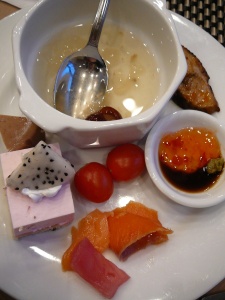Do you remember this ‘mystery soup’ from the International Women’s Day post?
When we walked around the courtyard before Women’s Day dinner, Wang老师 had commented on the bamboo shoots. I said I had eaten some with my friend Pan in Nanjing. They’re very good, and I told her about a funny incident I’d had the previous weekend regarding bamboo shoots: I had asked Pan what they were called. “Baby Bamboo!” she and her friend decided to translate it into English (similar to Baby Spinach). “婴儿竹子 (ying1erzhu2zi)” I replied, combining the Chinese words for ‘baby’ and ‘bamboo’. Pan stopped with her spoon halfway to her mouth, looked at me, and said, “Now, that’s just creepy.”
During Women’s Day dinner, I went up to the buffet to gather my dessert-plate. I added to it a small amount of a strange, but sweet-smelling soup. The soup seemed to have Zaozi, little “Chinese dates” that are like tiny, softer apples, in addition to some thin, wrinkly, yellow-white things. I wondered if it was jellyfish, but the texture wasn’t like jellyfish…
“Oh, what soup is that?” Wang老师 asked when I returned to the table. “I have no idea!” I replied. “Is this Zaozi?”, I asked, pointing to the date-like fruit. She said yes. Ok, one down…
“Oh,” she said, indicating the suspected non-jellyfish, “These are 银耳. 白木耳, Like 木耳, but they’re white.” 木耳 mu4er3 (tree ear) is the name of a mushroom commonly used in Chinese cooking, so called because it’s thin and folded, like an ear. The new food seemed to have two names: 白木耳 and 银耳. I understood the 白木耳, a white tree ear, but the 银耳 pronunciation, and therefore meaning, was just escaping me. I tried to repeat it, unsure if the first syllable was a 1st or 2nd tone: “ying2耳 还是 ying1耳?” I tried.
Wang老师 kind of froze with her cup in her hands.
“银!yin2!银色的银!” she corrected me. Oooh.. silver. The things were called “silver ears” even though I thought the color seemed more like soft yellow-white than silver. ‘Silver’ is yin2: ‘yin2耳’. I had said ‘ying1耳’.
“Baby Ears!” Wang老师 cracked up, and so did the rest of the table when she translated the situation 🙂
